Dozens dead as Ukraine claims control of Donetsk airport
Putin immediately calls on Ukraine to end its "punitive" operation.
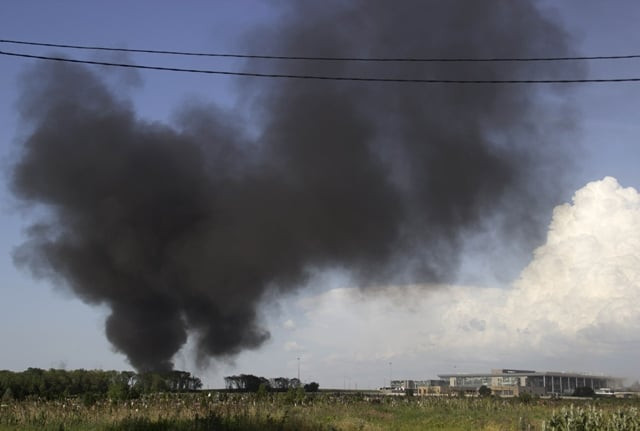
Black smoke billows from the airport. PHOTO: AFP
Russian President Vladimir Putin immediately called on Ukraine to end its "punitive" operation in the rebel-held east and for talks between Kiev and the insurgents.
The battle for the main transport hub in Ukraine's industrial heartland erupted on Monday just hours after president-elect Petro Poroshenko vowed to take a tough stand against the "terrorists".
"The airport is under our full control. The enemy suffered heavy losses. We have none," Interior Minister Arsen Avakov said in a statement.
He said however that the military was continuing its operation at the airport and AFP journalists reported hearing sporadic gunfire and explosions during the morning.
The Organisation for Security and Cooperation in Europe also reported being unable to establish contact with a four-member observer team based in the restive city since Monday evening.
Donetsk mayor Oleksandr Lukyanchenko told reporters that two civilians and 38 combatants had died. Rebel leaders suggested that the toll among their ranks could be higher.
An AFP correspondent reported seeing body parts and blood splattered near a bullet-riddled truck on the airport road, where makeshift blockades had been set up with dumper trucks and piles of tyres.
Combat jets and helicopter gunships struck the airport terminal Monday after it was seized by scores of gunmen just a day after Ukraine's presidential election won by Poroshenko.
The strikes represented the most forceful action by Kiev yet in its battle to crush a bloody rebellion that has raged in the coal and steel belt since early April and threatened to tear the former Soviet state apart.
The military action has also revived tensions between Kiev and Moscow, which had initially said it was ready to work with the new leader of its western neighbour.
In his first comments on Ukraine since Sunday's election, Putin called "for an immediate end to the military's punitive operation in southeastern regions and the establishment of peaceful dialogue between Kiev and regional representatives," the Kremlin said in a statement issued following a phone conversation with Italian Prime Minister Matteo Renzi.
Poroshenko, a 48-year-old pro-Western chocolate tycoon, had said he was ready to engage with the Russian leadership and was optimistic a meeting with Putin could be arranged soon.
On Tuesday, however, Russian Foreign Minister Sergei Lavrov -- who had initially said Moscow was open to "pragmatic dialogue" with the new leader -- declared that a visit to Moscow by Poroshenko was "not being considered."
Sunday's election had been viewed as crucial if Ukraine was able to turn the page on months of turmoil that followed the February ouster of Kiev's pro-Kremlin leadership by a pro-EU protest movement.
Kiev and the West accuse Russia of pulling the strings of the insurgents who took up arms against the central government in the wake of the Kremlin's seizure of the Black Sea peninsula Crimea in March.
The United States and its allies had warned of another round of sanctions against Moscow if it meddled in Sunday's election, which saw Poroshenko declared the clear winner with 54 percent of the vote.
In the days before the poll, Russia also announced it had started withdrawing from Ukraine's border around 40,000 soldiers whose presence had raised Western suspicions it could be planning to invade.
Poroshenko, a political veteran, said Monday the military would press on with its offensive against the insurgents who now control about a dozen cities and towns in the east.
And he insisted there would be "no talks with terrorists" until they laid down their arms.
The insurgency, which has now cost around 200 lives, thwarted polling in much of the east and rebels have defiantly refused to recognise Poroshenko's election.
But a 1,000-strong team of international monitors led by the OSCE concluded that the election "largely upheld democratic commitments" and provided Poroshenko leader with the legitimacy needed to tackle the insurgency.
The OSCE said on Tuesday it had lost contact with four members of its Special Monitoring Mission when it went out "on a routine patrol east of Donetsk" on Monday.
It added that both the Ukranian government and regional authorities had been informed of the situation.
Western leaders have praised the outcome of the election and German Chancellor Angela Merkel said it was now time to "continue the path of internal reconciliation".
Poroshenko also faces a daunting task to trying to avert economic collapse after years of Soviet-era mismanagement and rampant corruption.
The IMF, which is leading $27-billion international bailout package to avert Ukraine's bankruptcy, has forecast that the economy will shrink by at least five percent this year.
Ukraine is also trying to negotiate a deal to prevent Russia from cutting off gas supplies from next week if it fails to pay more than $5 billion demanded for debts and prepayments for June deliveries.

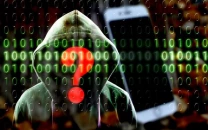
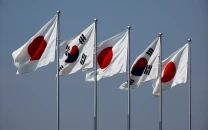
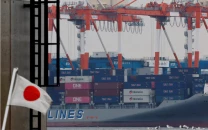

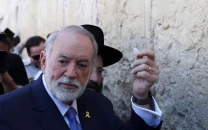
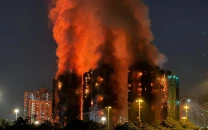











COMMENTS
Comments are moderated and generally will be posted if they are on-topic and not abusive.
For more information, please see our Comments FAQ